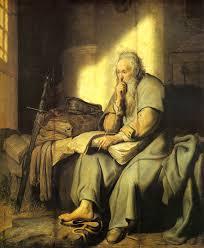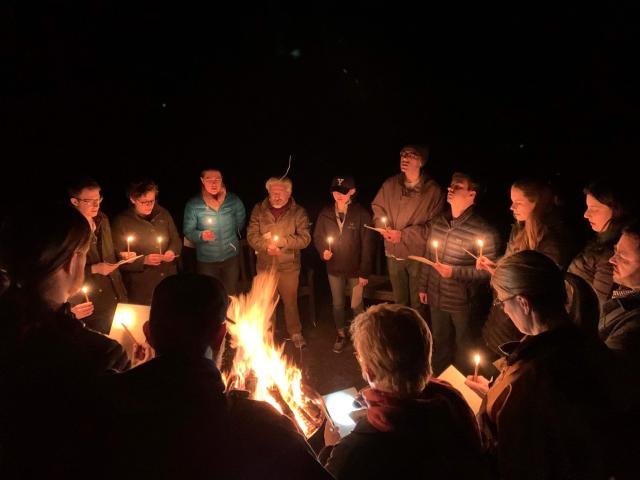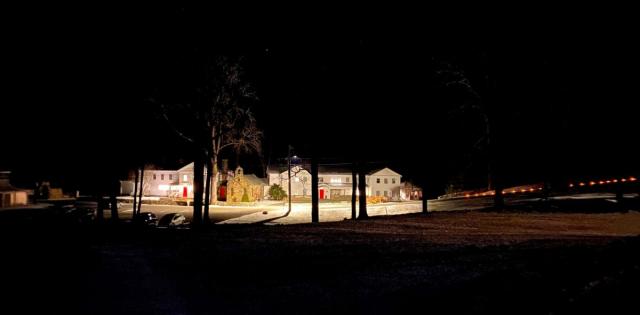Channeling Paul of Tarsus in a Time of Pandemic
Walking through the Trinity Forest in West Cornwall, Connecticut, this morning, I found myself praying to Jesus—and wrestling with Paul in prison.
As we enter Holy Week as self-isolated captives of an unforgiving global pandemic, I’m trying to wrap my head around the apostle’s upbeat attitude in his letter to the first-century Christians in Philippi.
After being cooped up for nearly three weeks straight, we’re all suffering in some way as prisoners of COVID-19, whether it’s from anxiety, unemployment, Zoom fatigue, the inability to hug friends, or, most heartbreaking, grieving the departed. It’s not hard to relate to Paul’s predicament in Philippians. He was locked up and in chains, unsure if he was to be released or be executed. Yet this was his message from his prison cell: When life gets grim, be joyful. Indeed, he spends much of Philippians making a case for joy being an act of defiance. In his suffering, he gives an exhortation in Philippians 4:4 that many of us likely find bewildering in this time of pandemic-fed sorrow, confusion, and solitude. It reads: “Rejoice in the Lord always; again, I will say, Rejoice.”
Rejoice? Now? How does that work, especially as we pull away from our neighbors to slow the insidious spread of the novel coronavirus?
Our new Lenten practice of “social distancing”—a phrase few had heard a couple months ago—presents a sudden crisis of how we have always practiced our faith. Caring for the sick, welcoming the stranger, and reaching out to the suffering in their darkest hour is at the heart of our calling as Christians. It is an ancient commission. Indeed, historians suggest that the 2nd century Antonine Plague, which likely killed off a quarter of the Roman Empire, and the Plague of Cyprian in the 3rd century helped spread Christianity because its early followers cared for the sick. Religious demographer and sociologist Rodney Stark contends that death rates in cities with Christian communities likely was just half of other cities during the Plague of Cyprian. But caught in the deadly breath of COVID-19, entering what U.S. Surgeon General Jerome Adams warns is “going to be the hardest and the saddest week of most Americans’ lives,” we are under orders to close our doors and stay away from the suffering. For disciples of the rabbi who reached out and healed the lepers, there’s a heartbreaking feeling of helplessness as we hear of scores of people dying without someone at their bedsides.
Then again, it is very Pauline. We are where God wants us to be.
Seminarians from Berkeley Divinity School at Yale during an earlier visit to the Trinity Retreat Center.
Last week, one of my spiritual mentors at Yale Divinity School compared her state of being to Jonah and the whale: “I’m in the belly of the beast. We can’t go out. It’s dark. It’s messy. You can’t see.” It’s an apt comparison. But I’m sticking with Paul’s prison epistle to the Philippians.
Paul’s joyful words, inked amidst brutal hardship, just might be the perfect place to ponder the incarnation and crucifixion of Jesus in the shrinking walls of our apartments. Indeed, they are an invitation to see our own struggles and sacrifices as participating in the bigger story of Jesus.
It’s helpful to know Paul’s story. The apostle’s entire ministry was a lesson in affliction. Paul was shipwrecked, beaten, snake-bitten, hunted by assassins, and frequently jailed for long periods. The church in Philippi was the first Jesus community that Paul started in Eastern Europe. Filled with retired soldiers, Philippi was a Roman colony where patriotic nationalism was rampant, making life hard for people trying to be faithful to the way of Jesus. Being in a Roman prison was no picnic, but Paul thanks his supporters in Philippi for their support. All things considered, he seems to be in a pretty good mood about his situation and calls on the Philippians to rejoice with him in his adversity.
The words “joy,” “rejoice,” and “be glad” appear a combined sixteen times in the short letter. Paul isn’t encouraging Christians to throw a party in response to suffering and hardship. Rather, he is imploring us not to give into fear.
Rather than responding with suspicion, terror, and panic shopping at the grocery store, Paul’s letter invites us to focus on what is true and life-giving. His recipe for Christians in bewildering times like these can be found immediately after the double “rejoice” of Philippians 4:4. “Let your gentleness be known to everyone,” Paul continues. If you have faith that God is in control, you can be joyful, because you know that you are not alone, even when you are forced into isolation. “The Lord,” he promises, “is near.”
Sure, Paul might have been alluding to the eschaton and his belief that Jesus’ return was near. In the age of the coronavirus and virtual worship, however, his words are a reminder that the Holy Spirit moves through our lives and all of history. Philippians is a reminder that the call to suffer is one of the most counter-cultural things about Christianity. Suffering as well as love are part of the human experience, often leaving us trying to decipher the meaning of God’s will.
Living life as an expression of Jesus’ ministry is supposed to be challenging, isn’t it? But faith should also give us the ability to see beauty and hope in any circumstance. “Don’t worry about anything,” the apostle writes. Make your needs known to God, he says.
In other words, name it. Faith. Doubt. Anger. God can handle it, as long as we’re honest in our prayers. The liberating part: The words don’t have to be perfect. “There is actual virtue in being honest with God,” the Most Rev. Michael Curry, presiding bishop of the Episcopal Church, said on NBC’s Today last week. “Being honest with God means just telling God what’s in your heart, just putting it out there.” The psalmists knew that. Their most brutal honesty came when they found themselves at their lowest ebb, when they felt furthest from God. In the new book Open and Unafraid: The Psalms as a Guide to Life, U2 front man and Nobel Peace Prize nominee Bono, famous in part for lyrics inspired by the psalter, writes, “The psalms I hold on to longest and tightest are a communication from a darker territory, from a place of pain or abandonment, from a place of fear and doubt.”
For me, there is something cathartic and comforting in the psalms of communal lament. I’ve been reading them in the forest. They often end with words of awakening that are not too dissimilar to one of my favorite quotes from another book about a prisoner. “Happiness can be found even in the darkest of time, if one only remembers to turn on the light,” says wizard headmaster Albus Dumbledore in Harry Potter and the Prisoner of Azkaban.
In response to our honest prayers from the darkness, Paul promises, God’s peace will guard our hearts and minds through Christ. We’re not supposed to overthink it. Paul is urging us to live into the mystery of the crucifixion and the resurrection. The peace of God, he notes, “surpasses all understanding.” That’s powerful. It’s comforting. And yes, it is a knowledge that can inspire joy, especially when we’re feeling alone.
The Trinity Retreat Center in western Connecticut, temporarily closed to halt the spread of the novel coronavirus (COVID-19).
Considering that I am waiting out the pandemic with Heidi, my wife and co-executive director, on the 55-acre Trinity Retreat Center—tucked between the Housatonic River and Trinity Forest—it feels odd to be lamenting about my seclusion. I fear that I might come off as tone deaf. But our lives are fed by welcoming the stranger and building community—by offering a defiant joy away from the world’s troubles so that people can return to do God’s work in their neighborhoods feeling revived and healed. We miss you. The place is a ghost town. More than ever, we feel like we’re living in the middle of nowhere. We might as well be on Mars.
Whether it is Hagar’s escape into the wilderness, baby Moses' abandonment in the bulrushes of the Nile, or Jesus being tempted by the devil, the Bible reminds us that God is attendant in our isolation. Jesus was also utterly alone, naked and defenseless as he hung from the cross, suffering a humiliating death normally associated with the execution of Roman slaves.
If we are where God needs us to be right now, where can we find joy in our isolation? With Good Friday on the horizon, maybe we can start by closing our eyes and meditating on all that was good and true and lovely about the incarnation. As you sit, let your senses guide you. Think about all that God “made flesh” was exposed to in this world—color, touch, fatigue, lament, pain, and, yes, even disease. Cling to all that is accessible and real.
Paul tells us these moments of hardship can be our greatest teachers. Certainly, losing a job, putting our lives on hold, and staying out of reach of people you love can hurt—a lot. At the same time, by shutting our door and stopping everything, we are protecting the weak, the sick, and the old from a terrible suffering. It just might the be the greatest sacrifice that we as families, neighbors, and people of faith will make together in our lifetime. If it’s not a reminder of the suffering Jesus endured, let it be proof that we can still perform bold acts of surrender in the name of love.
This is a season to celebrate every little blessing, tend to ourselves, light a candle for physicians and scientists, and prepare for the day when we will emerge from our seclusion to help heal our communities and live fully into our baptismal covenant.
Remember this week: We are the people of the Resurrection. We believe in what others consider impossible. We can trust that God’s peace will protect our hearts and minds—and we’re free not to worry about how it will happen. It surpasses all understanding. We will walk away from this and be together again. In West Cornwall, I can’t wait to welcome and hike with you in the Trinity Forest again.
Until then, the Lord is “near.” God doesn’t have to maintain a distance of six feet. The Holy Spirit is in each of us. In that, we can find defiant joy.
Joseph Rose is executive director of programming at Trinity Retreat Center and an Episcopal seminarian at Yale Divinity School.


